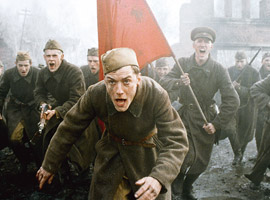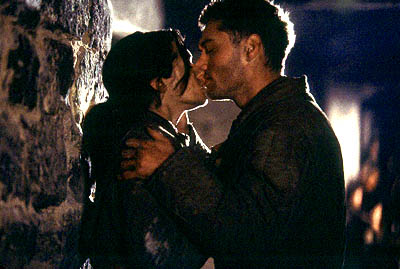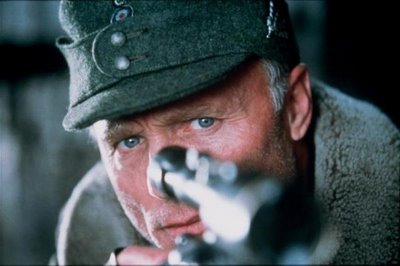Enemy at the Gates (2001)
DIRECTOR: Jean-Jacques Annaud
CAST:
Jude Law, Joseph Fiennes, Rachel Weisz, Ed Harris, Bob Hoskins, Ron Perlman, Eva Mattes, Gabriel Thomson, Matthias Habich
REVIEW:
The Russian front in WWII hasn’t gotten much attention in a big-budget war film, so French director Jean-Jacques Annaud deserves some credit for giving us a rarely-shown viewpoint. However, the result is a mixed bag.
In late 1942, the German Sixth Army advanced on the Russian city of Stalingrad. While of limited strategic importance, the city was of enormous symbolic significance because it bore Stalin’s name. The brutal siege carried on for months, resulting in over a million people killed in some of the most savage house-to-house urban warfare in military history. In the end, the Soviets’ dogged tenacity won out, an entire German army was obliterated for the first time in the war, and many historians mark this as the turning point of WWII. In the middle of this is the story of Russian sniper Vassili Zaitsev (Jude Law), who racks up scores of German officers and his propagandized by his friend, commissar Danilov (Joseph Fiennes, brother of Ralph), who sees a hero to build up, both to save flagging Soviet morale and to appease the bombastic Nikita Khrushchev (Bob Hoskins), who has arrived in Stalingrad to whip things into shape. Soon, Zaitsev has picked off so many Germans that they send an aristocratic sniper, the skilled and implacable Major Konig (Ed Harris), to hunt him down. Meanwhile, both Zaitsev and Danilov fall for a female sniper, Tenia (Rachel Weisz), whose parents were killed by the Germans.
 Arguably Enemy‘s best scene is its first, as scores of insufficiently armed Russian troops are hurled headlong across the Volga into the ruins of Stalingrad, first enduring bombings and strafing runs by Stuka dive bombers, and then sent in a futile charge against a dug-in German position. There’s a bit of Saving Private Ryan in the bloody chaos of this opening sequence, and the brutality of the Soviet regime toward its own people is not glossed over; when the survivors try to retreat, they are gunned down by their own officers just as mercilessly as if they had kept charging toward the Germans. The recreation of the devastated city is effective and convincing, taking the audience on a tour of bombed-out buildings, underground tunnels, and huge empty factories where Zaitsev and Konig lie in ambush. From a technical standpoint, Enemy at the Gates is a well-crafted film.
Arguably Enemy‘s best scene is its first, as scores of insufficiently armed Russian troops are hurled headlong across the Volga into the ruins of Stalingrad, first enduring bombings and strafing runs by Stuka dive bombers, and then sent in a futile charge against a dug-in German position. There’s a bit of Saving Private Ryan in the bloody chaos of this opening sequence, and the brutality of the Soviet regime toward its own people is not glossed over; when the survivors try to retreat, they are gunned down by their own officers just as mercilessly as if they had kept charging toward the Germans. The recreation of the devastated city is effective and convincing, taking the audience on a tour of bombed-out buildings, underground tunnels, and huge empty factories where Zaitsev and Konig lie in ambush. From a technical standpoint, Enemy at the Gates is a well-crafted film.
 Unfortunately, Enemy at the Gates also has problems, most prominently that it can’t seem to make up its mind whether it wants to be a gritty, realistic war movie, or a cliched wartime love story. We are plunged into one of the most brutal battles of WWII in which over a million people died horribly, and then spend most of our time, when we’re not watching a contest between two snipers, focusing on whether Tenia will end up with Zaitsev or Danilov. Annaud spends the money and the effort setting up epic battle sequences, and then, after the Zaitsev vs. Konig duel is resolved, doesn’t even bother to show us how the battle ended. Pearl Harbor-style, epic history is diminished to a one-on-one vendetta and a love triangle. It doesn’t really matter how the Siege of Stalingrad turns out, just so long as Jude Law and Rachel Weisz end up together.
Unfortunately, Enemy at the Gates also has problems, most prominently that it can’t seem to make up its mind whether it wants to be a gritty, realistic war movie, or a cliched wartime love story. We are plunged into one of the most brutal battles of WWII in which over a million people died horribly, and then spend most of our time, when we’re not watching a contest between two snipers, focusing on whether Tenia will end up with Zaitsev or Danilov. Annaud spends the money and the effort setting up epic battle sequences, and then, after the Zaitsev vs. Konig duel is resolved, doesn’t even bother to show us how the battle ended. Pearl Harbor-style, epic history is diminished to a one-on-one vendetta and a love triangle. It doesn’t really matter how the Siege of Stalingrad turns out, just so long as Jude Law and Rachel Weisz end up together.
 Much more interesting than the love triangle hand-wringing is the cat-and-mouse game between Jude Law’s wide-eyed Zaitsev and the older, more professional, unemotional Konig. Zaitsev is a naturally prodigiously talented sniper, but Konig is not only at least as skilled as he is, but also far more ruthless. The real Zaitsev did not have the pretty boy looks- or the crisp English accent- of Jude Law, but if the accent isn’t too much of a distraction, Law is actually pretty good at playing both Zaitsev as a steely-eyed killer and the more naive and sensitive side. Rachel Weisz and Joseph Fiennes aren’t bad, either, but their characters are mostly on hand to supply the more soap opera-esque elements, and thus not as interesting. Incidentally, no one really makes any attempt at a Russian accent, so we have Law, Fiennes, and Weisz speaking in their natural prim English accents, and just to make the bag of accents a little more inconsistent, Ed Harris speaks with his normal American voice but shares a couple scenes with native German actor Matthias Habich (as Sixth Army commander General Paulus) who has a German accent. Americanness aside, however, Harris is still well-cast, and with his frosty blue eyes and stoic demeanor, brings a little extra something to an underwritten character. Ron Perlman provides a little comic relief in a small role as another Russian sniper, and Bob Hoskins, who looks the part pretty well, is suitably gruff and profane as Khrushchev.
Much more interesting than the love triangle hand-wringing is the cat-and-mouse game between Jude Law’s wide-eyed Zaitsev and the older, more professional, unemotional Konig. Zaitsev is a naturally prodigiously talented sniper, but Konig is not only at least as skilled as he is, but also far more ruthless. The real Zaitsev did not have the pretty boy looks- or the crisp English accent- of Jude Law, but if the accent isn’t too much of a distraction, Law is actually pretty good at playing both Zaitsev as a steely-eyed killer and the more naive and sensitive side. Rachel Weisz and Joseph Fiennes aren’t bad, either, but their characters are mostly on hand to supply the more soap opera-esque elements, and thus not as interesting. Incidentally, no one really makes any attempt at a Russian accent, so we have Law, Fiennes, and Weisz speaking in their natural prim English accents, and just to make the bag of accents a little more inconsistent, Ed Harris speaks with his normal American voice but shares a couple scenes with native German actor Matthias Habich (as Sixth Army commander General Paulus) who has a German accent. Americanness aside, however, Harris is still well-cast, and with his frosty blue eyes and stoic demeanor, brings a little extra something to an underwritten character. Ron Perlman provides a little comic relief in a small role as another Russian sniper, and Bob Hoskins, who looks the part pretty well, is suitably gruff and profane as Khrushchev.
The contest between Zaitsev and Konig is psychological as well as physical; Zaitsev’s confidence falters when he realizes the caliber of his opponent, while Konig seems to inexorably close in with cold, clinical, professional detachment. Unfortunately, after taking pains to provide Konig with his own (however harsh and ruthless) sense of honor, and a few admirable qualities- he’s too professional and all-business to pay any attention to Nazi propaganda, he admires Zaitsev’s cleverness, and can respect a Russian’s sense of loyalty to his own side even as it obliges him to kill him- the film throws in a gratuitous and unnecessary ‘evil German’ random atrocity scene, that like love triangles, seems a requisite in big-budget Hollywood WWII movies. Neverthless, it’s in this high-stakes chess game, where the only options are victory or dying unknown and unmarked, where the movie finds its focus and its interest. The rest- the love story, and the melodrama that too few WWII would-be epics have the confidence in the inherent drama of their material to do without- feels like unwieldly fat lumped onto a tight and streamlined frame.
**1/2